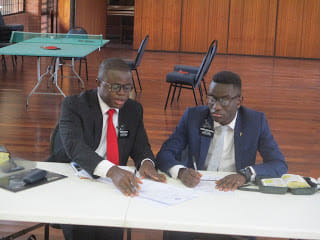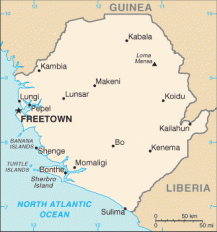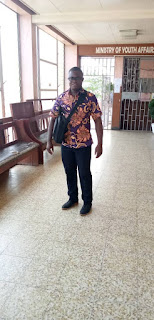FRANCIS BEN KAIFALA, ESQ, Commissioner, ACC
“ARISE YOUNG PEOPLE! TAKE YOUR PLACE IN SIERRA LEONE’S REVOLUTIONARY DEVELOPMENT"
*Speech Delivered by Francis Ben Kaifala, Commissioner of the Anti-Corruption Commission of the Republic of Sierra Leone, at the 3rd Cohorts Passing-out of the National Youth Service Corps, On 1st February, 2021, at SILEA, Hastings.*
*INTRODUCTORY*
All protocols observed, distinguished ladies and gentlemen.
As Mandela, would say *“Whenever I am with energetic young people, I feel like a recharged battery myself”*. I am honoured to have been invited by the Minister of Youth Affairs, and the National Youth Serve Coordinator to make this key note address at such a historic event for the young people of Sierra leone.
The National Youth Service was established in 2016, but commissioned in 2018, to provide the requisite training, and transitional preparation for young graduates to enter the tough Sierra Leone job market so they can harness the opportunities out there for sustainable livelihood. This laudable enterprise by our government is the highest point for consideration of youths and their needs since independence to date. It is both laudable and commendable.
Issues pertaining to young people should be on the hearts and minds of all modern-day decision-makers. This is because, as the World Bank rightly puts it, *“Young men and women today face increasing uncertainty in their hopes of undergoing a satisfactory transition . . . and this uncertainty and disillusionment can, in turn, have damaging effects on individuals, communities, economies and society at large.”*
Africa’s population currently stands at 1.2 billion. 75 percent of this huge population is made of young people under the age of 35 years. For Sierra Leone’s estimated 7.5 million population, statistics show that about 80 percent is made up of young people under the age of 35, according to the non-governmental organization, Restless Development. Of this, also, one-third is between the ages of 15-35. This youthful population represent the present and the future. You are the “today” and “tomorrow” of this country.
*CHALLENGES CONFRONTING YOUNG PEOPLE*
Almost all the research I have come across have similar points on the issues affecting young people; including the lack of job opportunities, high illiteracy rate, drugs abuse, lack of decent and affordable housing, perpetration of, and involvement, in crimes and violence, among others.
UNDP figures indicate that 70 percent of our youth population are either underemployed or unemployed. The situation is, in fact, grimmer for young women. ongoing COVID-19 pandemic ravaging the world, has massively worsened the situation, as the closure of businesses has led to hundreds of thousands of young people losing their jobs.
Compounding this situation is the high illiteracy rate among Sierra Leoneans, with the New Education Policy stating that about 69 percent of the male population and 80 percent of the female population are illiterate.
Even though they are often considered as the energetic workforce, yet a large percentage of young people remain under the poverty level. The UNDP, for example, says that as high as 80 percent of the youth population of Sierra Leone cannot earn enough to lift themselves and their families above the 2 dollar per day poverty level.
All these issues just highlighted have a corresponding link with anti-social behaviors normally associated with young people, especially in relation to substance abuse. The World Health Organization reports that between 5.2% and 13.5% of young people in West and Central Africa are engaged in substance abuse, which includes injecting drugs, stimulants such as ‘Ecstasy’, ‘Tramadol’, ‘Kush’, among several others. WHO points out that such practices carry a high risk of infection of deadly diseases such as HIV, hepatitis B and hepatitis C.
When young people engage in substance abuse, they normally also become perpetrators of violence and crimes. The Sierra Leone Police, for example, has identified young people as forming the largest percentage of accused persons normally remanded for crimes like murder, armed robbery, pick-pocketing, among others.
*OPPORTUNITIES FOR YOUNG PEOPLE*
Francine Muyumba, President of The Pan African Union (PYU), once told an African Youth Summit that as young people form the majority of the continent’s population, they should be *“given higher priorities in all spheres, be it economic, education, health and peace and development”*.
In Sierra Leone, in spite of all the challenges I have highlighted, I also know that there are huge opportunities, which if harnessed fully, will uplift young people from their present-day predicament. We all are witnesses to the strategic and concrete steps being undertaken by the Government to raise responsible and resourceful youth, under the Government’s Human Capital Development Agenda, and not nurture youth with *‘Bra you borbor dae’ syndrome.*
That is why the President, His Excellency, Rtd. Brig. Gen. Dr Julius Maada Bio, clearly stated in the State Opening of the Second Session of the Fifth Parliament in May 2019 that; *“the practice of providing handouts to our youth is not sustainable and cannot change the lives of our youth”*. That is why he has not only consistently expressed his determination to alleviate the sufferings of youth, but has also taken the necessary and required steps to provide the enabling environment for young people.
From the education sector to the agriculture sector, from ICT to the Technical and Vocational sector, there are enormous opportunities being created for the youth of this country today.
We all have seen the tremendous programmes being rolled out for young people under the Government of President Bio through the vibrant Youth Ministry and the National Youth Commission. At the vocational and tertiary levels, our institutions are being made centres for comprehensive capacity building and locally relevant to our national development.
As the President himself put it while speaking at the Forum on the Future of Education, in December last year, there are; *“initiatives to improve access to TVET and tertiary institutions, review policies that will clarify curriculum objectives and improve learning outcomes in various delivery modes, develop capacity through global partnerships and research, review existing acts and governing policies, improve financial management and quality assurance, and implement various infrastructural and technology projects that will substantively improve the quality of our TVET and tertiary institutions and make us regionally, if not globally, competitive”*.
And the President was absolutely right, when he told students of the Milton Margai College of Education and Technology last year that, *“If the fourth industrial revolution and the future of global trade and investment is about automation, big data, artificial intelligence, advanced robotics, efficient machines, then our workforce of the future must be equipped with the requisite skills to participate meaningfully in that global economy”.*
In line with this, we are all witnessing to the truth that the Government is investing tens of billions of leones for workforce development through basic training, reskilling, and upskilling in a bid to expose young people to innovation, manufacturing, agriculture and economic transformation. To ensure this happening faster, we see the government has taken steps aimed at transforming some of the polytechnics into universities, so that more attention and resources will be dedicated to them in order to educate productive Sierra Leoneans with the required skillsets needed in the coming years.
At the tertiary education level, we see that the Government is introducing a student loan scheme, which is at its advanced stage of development – based on my independent research, *“to provide universal access to higher education while still supporting the most-needy students with Government grants-in-aid”*.
There is also the Youth in Agriculture and Youth in Fisheries programmes being implemented by the Government through the Ministry of Youth Affairs. In fact, when it comes to agriculture, the international humanitarian organization, Mercy Corps, is emphatic on the benefits young people will derive from this sector: *“Engaging youth meaningfully in farming as well as in agriculture, can provide young people not simply with income, but also with work that is meaningful, respectable, and attractive”*. By this, they believe young people can drive their economies forward through the immense potentials this sector provides.
We have all seen, recently, the commissioning of hundreds of tractors and other farming equipment to enhance large-scale mechanized farming across all the agricultural districts of the country. You may have also seen the launching of a large-scale farming project by the Rt. Hon. Vice President, Dr Mohamed Juldeh Jalloh in Port Loko District. An agricultural investment group from the UAE is investing over 50 Million Dollars in rice cultivation at the Rhombeh swamps, made up of 14,700 hectares of farmland.
In the area of businesses, the Government has also been very magnanimous by providing soft loans to small-scale businesses, which are mostly operated by women and young people, to enhance their social and economic wellbeing. This also goes along with the social safety net, targeting the poor and vulnerable population, to alleviate them from poverty.
In combating corruption, which, as you all will agree with me, is one of the biggest enemies to the development of young people, I and my Team at the ACC continue relentlessly lead the effort to give corruption the bloody blow that it deserves. We have strengthened our laws, by facilitating the passage of the Anti-Corruption (Amendment) Act, 2019, which has helped us greatly in revolutionizing the fight against this deadly enemy with hitherto only imagined results. I need not repeat the immense progress we have made which has made Sierra leone to occupy respectable position in global indexes.
More importantly, we are here to be witnesses to the passing out of the 3rd cohorts of National Youth Service corps as part of the government’s delivery on promises to cater for young graduates in the job market by creating opportunities and sustainable livelihood..
Young graduates, have been trained and prepared mentally, physically and emotionally to face the real world and gained much-needed practical experience to face it with the view to conquer. You're mission is to rise up to the challenge and use the opportunities available to make Sierra Leone occupy its place of respectability in the Comity of nations that are called “great”.
*YOUNG PEOPLE SHOULD RISE AND BE PART OF SIERRA LEONE’S REVOLUTIONARY TRANSFORMATION*
From all what I have highlighted, young people should now clearly see that a very fine and fertile ground has been set not only for their development but for the development of the whole nation. More needs to be done and will be done. But take advantage of the opportunities that today present.
The learning environment and opportunities that have been created by the Government, are ones that the youth of this country must embrace and take advantage of today and firmly launch the country into the glorious future.
Those currently enrolled in schools and tertiary institutions must be studious and work hard to make their studies meaningful to society. Those with no formal education should acquire meaningful skills from polytechnics so that they can live a productive life by contributing to their country’s socio-economic rebirth.
As young people in this National Youth Service Corps, you should see yourselves as guardians and protectors of public projects and resources. For example, where there are clear signs of willful destruction and sabotage of public utilities, you should, and must, stand up and do what it will take to secure them. Patriotism is a charged action word. We have to each go around with love of this country etched lovingly on the scrolls of our hearts and be willing to live or die defending it from the wicked and unpatriotic!
Violence, crimes, and substance abuse, should ‘not be your portion’, as some people would say. You have to make your lives meaningful for yourselves, your families and society. One way of accomplishing this, is by getting yourselves engaged in productive activities as ambassadors of this brilliant initiative of government now known as the “National Youth Service”.
In the area of the fight against corruption, the young people of Sierra Leone should join the National and Global Accountability Agenda. In some countries, young people are setting up movements not only to fight against the scourge of corruption, but also to side with anti-corruption agencies in order to expose acts of corruption in their offices and communities. Others are setting up social media blogs to counter fake news, especially those stories that tend to undermine accountability and the work of the anti-corruption agencies. In some instances, young people set up community-based organizations, dedicated to matters of transparency, accountability and integrity in public life. And I am proud to say that the ACC has been working with a number of energetic and youthful organizations who have played tremendous roles in the fight against corruption.
*Conclusion*
Let me end by expressing the words of former UN Secretary General, Kofi Annan, by saying, “The path is yours to construct and pursue.” So, I urge you the youth to arise, be apparent, stand up, live up, jump up, leap up, straight up and take your place in Sierra Leone’s revolutionary development. Do not wait to be invited to take a seat on the table; demand one and occupy it fast. Now is the time to turn Sierra Leone’s dreams to today’s reality for ourselves and the benefit of our children. With youth constituting 80% of the population, you hold the keys to unlocking this country’s potentials. Unleash it! Turn left or right, tell the person standing next to you “we are the ones they have been waiting for”. Repeat! You are the ones they have been waiting for!
Long Live the Youth of Sierra Leone!!
Long Live Sierra Leone!
I thank you all!
*FRANCIS BEN KAIFALA, ESQ*
*THE COMMISSIONER*
*ANTI-CORRUPTION COMMISSION*
*SIERRA LEONE*



























